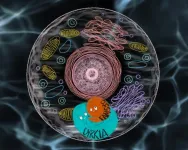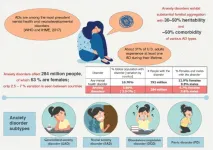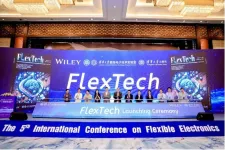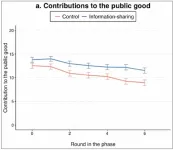Promising new treatment for a common hereditary nerve disease
2023-12-19
(Press-News.org)
Researchers from Tokyo Medical and Dental University (TMDU) develop a genome-editing technique that reduces disease-causing proteins and related issues in cells from a patient with Charcot–Marie–Tooth disease type 1A
Tokyo, Japan – Scientific advances in the last century have changed our world significantly. For example, the world of genetics has opened doors to a myriad of possibilities: augmented human capabilities, cures for diseases, and even changes to the course of evolution.
In a study published last month in Communications Medicine, researchers from Tokyo Medical and Dental University (TMDU) have unveiled a groundbreaking genome-editing technique. This innovation holds promise for treating Charcot–Marie–Tooth (CMT), a relatively common hereditary nerve disease that affects the nerves and currently has no clinical treatments.
CMT is characterized by altered sensation and muscle weakness in the limbs and affects 10 to 80 people per 100,000. The most common CMT subtype is known as CMT1A and is caused by a duplication of the gene encoding peripheral myelin protein 22 (PMP22), leading to high levels of this protein in affected individuals. PMP22 is important for forming myelin structural unit, the fatty insulation that allows signals to rapidly travel from the limbs to the brain and back.
Researchers have tried to reduce PMP22 in animal models of CMT1A using different techniques, but its translation to human patients has been unsuccessful. This may be because existing animal models do not have human-like PMP22 gene duplication. This study aimed to solve this problem.
“We created a cell model by taking cells from a patient with CMT1A and growing them into Schwann cells, which are the cells that make myelin,” says Dr. Hitoshi Okazawa, senior author of the study. “We then used a specialized genome-editing technique, known as AAV vectors, to decrease the amount of PMP22 protein that was produced by the cells.”
Because both higher and lower PMP22 levels can lead to different types of nerve diseases (known as neuropathies), the researchers had to be very careful about how much they reduced PMP22. They created and trialed different AAV vectors, and eventually chose one that removed 20% to 40% of PMP22 gene copies from the genome. This was enough to reverse many CMT-related changes in Schwann cell cultures and to improve the myelination abilities of these cells, thus highlighting the potential of this treatment as a clinical therapy for the disease.
“There are some kinks that need to be worked out before we can get this therapy into the clinic, though,” says Dr. Okazawa. “The optimal injection site for reaching Schwann cells remains unknown, and the timing of the injection, or injections, is likely to be important and also needs investigating.”
The researchers are cautiously optimistic because similar AAV-based gene therapies are beginning to be approved by the FDA for the treatment of hematological diseases. They believe that their therapeutic approach has low risks for human applications and may be relatively simple to translate into a clinical therapy. Given that there are currently no treatments for CMT beyond physiotherapy, occupational therapy, and pain management, the development of this genome-editing technique for PMP22 is an important breakthrough and may reduce symptoms and improve quality of life in CMT patients.
###
The article, “AAV-mediated editing of PMP22 rescues Charcot-Marie-Tooth disease type 1A features in patient-derived iPS Schwann cells,” was published in Communications Medicine at DOI: 10.1038/s43856-023-00400-y
END
[Attachments] See images for this press release:
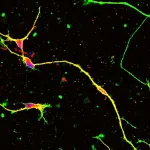
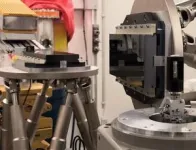
ELSE PRESS RELEASES FROM THIS DATE:
2023-12-19
Kyoto, Japan -- Down syndrome, a congenital disorder stemming from abnormal cell division and differentiation, is most common in newborns fated to neurodevelopmental delays and other health complications.
The genetic defect causes the dysfunction of the protein kinase DYRK1A, which is encoded on chromosome 21 and is deeply associated with both Down syndrome and autism spectrum disorder. DYRK1A has attracted attention as a target molecule for treating various diseases, but specific cellular mechanisms regulating ...
2023-12-19
Kyoto, Japan – December 2023
Anxiety disorders (ADs) affect more than 280 million people worldwide, making them one of the most common mental health conditions. ADs have a genetic basis as seen from inheritance in families, and people with one subtype of AD tend to have another subtype, suggesting a shared genetic basis. Although the brain circuitry involved in ADs has been identified, its link with gene expression remains unclear. Two researchers at Kyoto University in Japan set out to uncover this link and found two gene clusters expressed in ...
2023-12-19
Using a novel experimental approach, Max Planck researchers have discovered a core set of genes required by commensal bacteria to colonize their plant hosts. The findings may have broad relevance for understanding how bacteria establish successful host–commensal relationships.
Plants are colonized by an enormous variety of microorganisms, including bacteria, archaea and fungi, that form complex communities, or microbiomes, on their roots and organs. Although invisible to the naked eye, the importance of these tiny inhabitants should not be underestimated. They play a crucial role in plant nutrition, influence the health of plants, strengthen their tolerance to stress factors such as ...
2023-12-19
A new study provides the latest data on the low rates for screening and documenting Social Determinants of Health (SDOH) in healthcare settings.
SDOHs are a person's social, environmental and economic conditions highly correlated with their health outcomes. This includes unemployment, homelessness and illiteracy, among many other factors. Although SDOHs can contribute to a more comprehensive understanding of a patient's health and inform important policy changes, clinical offices fall short of tracking this information.
To better understand ...
2023-12-19
On December 9, 2023, the 5th International Conference on Flexible Electronics (ICFE 2023) was held in Hangzhou, China. The international academic journal, FlexTech, was officially inaugurated at this conference.
FlexTech is an initiative led by Tsinghua University, with academic support from the Laboratory of Flexible Electronics Technology Laboratory, Tsinghua University. This journal is co-published by Tsinghua University Press and John Wiley & Sons, Inc.
The editorial board of FlexTech is under the distinguished leadership of Professor Xue ...
2023-12-19
CLEVELAND—Throughout our lives, changes in our DNA, called genetic mutations, occur in every healthy cell of the human body—mutations which have long been thought to be an important reason why our bodies age.
But it’s not known whether some people accumulate mutations at a faster or slower rate with age, and whether those differences might predict how long we live and the risk for aging-related diseases like cancer.
With a $3.5 million research project grant from the National Institutes of Health (NIH), Jonathan Shoag, a surgeon-scientist at the Case Western Reserve University School of Medicine and urologic oncologist at ...
2023-12-19
(LOS ANGELES) – December 18, 2023 - The National Academy of Inventors (NAI) has named Ali Khademhosseini, Ph.D., Director and CEO of the Terasaki Institute for Biomedical Innovation (TIBI), as a 2023 National Academy of Inventors Fellow. This distinctive honor is the highest professional award that is exclusively bestowed upon inventors. The Academy has chosen to honor him for his achievements and contributions to the innovation ecosystem, which vastly influences science, society, and the global economy. Dr. Khademhosseini will be formally recognized at the NAI thirteenth annual meeting on June 18, 2024, where he will be presented with a medal by a senior official from the United States ...
2023-12-19
How is cooperation affected when people can receive secondhand information about what others are contributing? Ashley Harrell and Tom Wolff investigated this question through an online cooperation game. Participants were recruited from a large subject pool of university students and other adults, maintained by the Interdisciplinary Behavioral Research Center at Duke University. Over 200 participants were placed in groups of 6–10; however, each participant was only linked to some of the other participants. In the control condition, players could only see the contributions ...
2023-12-19
COLUMBUS, Ohio – New technology has allowed scientists to see how a major sporting event can disrupt public transportation in an entire city for hours before and after the event.
Researchers conducted a case study in Columbus on days that The Ohio State University had home football games, attracting more than 100,000 fans to Ohio Stadium on the university’s campus.
Findings showed that bus service across the entire city was significantly less reliable for more than 7 hours on game days compared to other days, meaning that even bus riders who were not traveling near the university ...
2023-12-19
In a perspective, Athanassios S. Fokas considers a timely question: whether artificial intelligence (AI) can reach and then surpass the level of human thought. Typically, researchers have sought to measure the ability of computer models to accomplish complex goals, such as winning the game of Go or carrying on a conversation that seems human enough to fool an interlocutor. According to Fokas, this approach has a key methodological limitation. Any AI would have to be tested on every single conceivable human goal before anyone could claim that the program was thinking as well as a human. Alternative methodologies are therefore needed. In addition, the “complex goal” focus does not ...
LAST 30 PRESS RELEASES:
[Press-News.org] Promising new treatment for a common hereditary nerve disease


